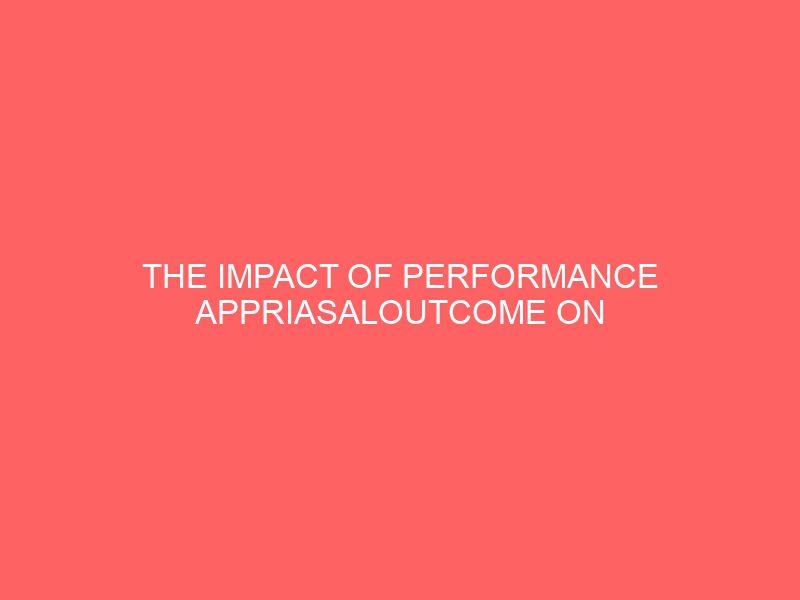Description
CHAPTER ONE
1.0 INTRODUCTION
1.1 BACKGROUND OF THE STUDY
A performance appraisal system is a good instrument that can be used to improve the quality of an organization?s work force performance of which it is considered as an important aspect in human resources management and as part of the control process in administration (Kavussi Shal, 1999). In order for an organisation to achieve its objectives, planning of the appraisal process is an important subject who should be undertaken to enable it achieves the objectives like work force development, including improvements, promotions and assignments in managerial positions, persuasion and punishment, salary increase, personnel’s performance feedback and determining their educational needs.
Performance appraisal system (PAS) is a critical component of the overall human resource management function in the civil service and indeed the World Health Organization There is an increasing use being made of the performance appraisal process (Meyer, 2001), generally motivated by an organizational desire to affect employee behaviors and attitudes and, ultimately, organizational performance (Boyd, 2004). This occurs because of the establishment of goals at the beginning of the evaluation cycle, which provides employees with clear performance targets, the monitoring of performance during the evaluation cycle (which can be used to assist poor performers) and the reinforcement provided for good performance through the provision of rewards, usually in the form of higher pay.
Performance appraisal is defined as the process of reviewing individual’s performance and progress in a job assessing his potential for future promotion.
Management writers have written on the outcome of performance and its usefulness to business organization and so performance appraisal as an important personnel management function.
Thus, it is necessary that the performance of the productivity are monitored, evaluated and control within the organization so that they can contribute their best to the attainment of the organization objectives as well as developing themselves.
Personnel management is concerned with the systematic requirement of a competent working force whose human resources are effectively used through the control of occupational environment in a manner that develop employee’s potential and enable them to contribute their services to the organization of which they are integral part.
It is a systematic method of obtaining, analyzing and recording information about a person that is needed for the followings:
i. For better running of the business.
ii. To help the manager improve the jobholder’s performance and plan his career.
iii. To assist the jobholders to evaluate his own performance and develop himself.
The usefulness of performance appraisal outcome includes promotion of employees, transfer, demotion and placement of employee on the job in which they are best suited.
Productivity describes various measures of the efficiency of production. A productivity measure is expressed as the ratio of output to inputs used in a production process, i.e. output per unit of input. Productivity is a crucial factor in production performance of firms and nations. Increasing national productivity can raise living standards because more real income improves people’s ability to purchase goods and services, enjoy leisure, improve housing and education and contribute to social and environmental programs. Productivity growth also helps businesses to be more profitable. There are many different definitions of productivity and the choice among them depends on the purpose of the productivity measurement and/or data availability.
1.2 STATEMENT OF THE PROBLEM
There has constantly been the issue of the relationship between performance and appraising such performance objectively. Some employees have seen appraisal as just a mere routine practice that has no relevance to their promotion, placement jobs and planning for their training needs thus having little impact on their development process.
A central problem of appraisal is subjectively on the part of those that conduct the appraisal. Other problems that the study will provide ways of solving them are: –
i. Errors of appraisal: – type and means of solving them to make appraisal programme valid.
ii. In appropriate use of appraisal methods.
iii. Perhaps the most glaring of all the problems is the failure of organization to use appraisal result as a basis for employee promotion, training and placement. When this occur.
It could be seen that the whole appraisal programme is a waste of effort and to make it meaningful and worthwhile the study will highlight the benefits of the use of appraisal system and it will also attempt to identify the way operational problem with a view to providing appropriate solutions.
1.3 OBJECTIVES OF THE STUDY
Essentially, the study has its central aim of examining the level of performance appraisal in Nigeria business organization and its contribution to the employee development. Other objectives of the study are: –
i. To examine the performance appraisal programme of the organization
ii. To examine the extent at which the appraisal result will meet the aspiration of the organization
iii. To make necessary recommendations based on the findings and these will serve as a guide to the business organization.
1.4 RESEARCH QUESTIONS
As pointed above, the objectives of this study is to find out the relevance of performance appraised to employee’s productivity. In doing this, the questions to be asked areª
i. Of what uses is performance appraisal outcome to the organization.
ii. Does an employee actually need performance appraised?
iii. Do the organization use the result of the appraisal programme for the development of the employee by using it to plan for their training, placement of the job and promoting then
iv. Does your management believe in performance appraisal system?
1.5 RESEARCH HYPOTHESES
HYPOTHESES I
The following hypotheses are formulated.
Ho: There is no significant relationship between performance appraisal outcome and employee’s productivity.
Hi: There is significant relationship between performance appraisal outcome and employee’s productivity.
HYPOTHESIS II
Ho: There is no significant relationship between performance appraisal outcome attainment of corporate goal.
Hi: There is significant relationship between performance appraisal outcome attainment of corporate goal.
HYPOTHESIS III
Ho: There is no significant relationship between’ performance appraisal outcome and enhancement of productivity of the employees in an organization
Hi: There is significant relationship between performance appraisal outcome and the enhancement of productivity of the employee in an organization.
1.6 SIGNIFICANCE OF THE STUDY
The significance of the study will -be in two folds: Firstly, the study will provide a good base for general knowledge of the concept, as past work on the subject matter will be reviled. More also, it will be useful empirically practical use of performance appraisal in business organization. All problems associate with the use of the programmed will be ex-rayed and necessary solution provided.
Lastly, the study will be useful to the organization in that the recommendation from the finding of this research can be use as a means of improving the efficiency of employees in the organization. And lastly, the findings can be used in designing and effective appraisal system.
1.7 SCOPE OF THE STUDY
The scope of this research is to examine the impact of performance appraisal outcome on employee’s productivity. The management and employees of Nigeria brewery will be used to carry out these researchers.
1.8 LIMITATIONS OF THE STUDY
Also, this research faces a lot of problems among this are the problem of time factor which is grossly, money to execute this research work on the schedule problem of getting necessary on for the respondents and above all, the uncooperative attitude of the workers of the brewery in attending to my request.
1.9 DEF1NITION OF TERMS
Some of the terms used in this study are defined as follows:
APPRAISAL: It is the evaluation of an individual with respect to his performance on his job.
PERFORMANANCE
It is defined from two perspectives:
– It is the result` that people get on the job.
– It is whatever they do that affects the results.
PRODUCTIVITY: Refer to being productive or production of goods; it is also regarded as an output.
EMPLOYEE: Workers in an organization who performed functions as given or directed.
DEVELOPMENT: It aims at adding to the skills of employees, improving their general knowledge and altering their attitudes.
DEMOTION: A shift to a lower position in the hierarchy.
PLACEMENT: Assigning employees to their different jobs that they are best suited.
PROMOTION: A shift to higher position in the hierarchy, usually with added salary, statues and authority.
RECRUITMENT: This is the process of attracting or hiring candidates among the qualified ones.







